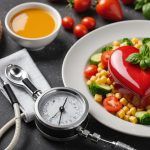Vital Dietary Recommendations for Expecting Mothers in the UK Aged 40+: Addressing Unique Health Requirements
As women age, their health and nutritional needs, especially during pregnancy, become increasingly complex. For expecting mothers in the UK aged 40 and above, it is crucial to follow specific dietary recommendations to ensure the best possible health outcomes for both mother and baby. Here, we will delve into the key nutritional requirements, risks, and practical advice tailored for this demographic.
Understanding the Unique Health Needs of Older Pregnant Women
Pregnancy at 40 or older is often referred to as advanced maternal age. This period is associated with several unique health challenges that necessitate careful nutritional planning.
Increased Risk of Health Issues
Women in this age group are at a higher risk of various health issues, including gestational diabetes, hypertension, and preterm birth. These risks underscore the importance of a well-balanced diet and appropriate supplementation.
Quote from Professor William Ledger, Fertility Specialist:
“There is good evidence that having a good level of folic acid in the bloodstream at the time of conception substantially reduces the risk of the baby having neural tube defects such as spina bifida. This is particularly important for older pregnant women who may have higher risks of complications”[4].
Have you seen this : Ultimate travel tips for expecting mothers: navigating uk airlines” air travel regulations
Essential Vitamins and Nutrients for Pregnant Women Over 40
Folic Acid
Folic acid is one of the most critical vitamins for pregnant women, regardless of age. However, its importance is amplified for women over 40 due to the increased risk of neural tube defects.
- Recommended Daily Intake: 400 micrograms of folic acid per day, starting three months before conception and continuing until at least 12 weeks into pregnancy[2][4].
- Food Sources: Leafy green vegetables, avocados, beans, eggs, and peanuts. Fortified cereals, breads, and pastas also contain folic acid[1][2].
- Public Health Initiative: The UK has introduced legislation to fortify non-wholemeal wheat flour with folic acid by 2026 to help reduce neural tube defects by 20%[2].
Iron
Iron is vital for the production of red blood cells and oxygen transport, which is particularly important during pregnancy when blood volume increases.
- Recommended Daily Intake: Women who are pregnant or breastfeeding may need higher amounts of iron. It is recommended to consult a healthcare provider for specific needs, but generally, pregnant women need about 27 milligrams of iron per day[1].
- Food Sources: Dark-green leafy vegetables, lean red meat, chicken, turkey, fish, cereals, beans, and whole grains. Consuming these foods with vitamin C-rich foods enhances iron absorption[1].
Vitamin E
Vitamin E is essential for overall health and can be particularly beneficial during pregnancy.
- Recommended Daily Intake: 15 milligrams per day for pregnant women. For breastfeeding women, the recommendation is 19 milligrams per day[3].
- Food Sources: Vegetables, fruits, nuts, seeds, and fish. Some fortified foods like breakfast cereals and fruit juices also contain vitamin E[3].
Healthy Eating and Weight Gain
Balanced Diet
A balanced diet rich in fruit, vegetables, whole grains, lean proteins, and healthy fats is crucial for pregnant women.
- Fruit and Vegetables: Aim for at least five portions a day, including a variety of colors to ensure a broad range of vitamins and minerals.
- Whole Grains: Choose whole grains over refined grains to increase fiber intake and support digestive health.
- Lean Proteins: Include lean meats, fish, beans, and lentils in your diet to support fetal growth and maternal health.
Weight Gain
Appropriate weight gain during pregnancy is vital for the health of both the mother and the baby.
- Guidelines: The National Health Service (NHS) and other health organizations provide guidelines on healthy weight gain during pregnancy. Generally, women with a normal BMI should aim to gain between 11 and 20 kilograms (24 to 44 pounds) during the entire pregnancy[4].
Supplementation and Public Health Support
Folic Acid Supplementation
Given the critical role of folic acid, supplementation is highly recommended.
- Public Health Advice: The NHS and other public health authorities advise women to take folic acid supplements starting three months before conception and continuing until at least 12 weeks into pregnancy[2][4].
Other Essential Supplements
While folic acid is the most emphasized supplement, other nutrients are also important.
- Vitamin D: Especially important for bone health and immune function. Many women are deficient, so checking vitamin D levels and supplementing if necessary is advised[4].
- Iron: For women with heavy periods or those who are anaemic, iron supplements may be necessary to prevent anaemia[1].
Practical Advice and Support
Consult Healthcare Professionals
It is crucial to consult healthcare professionals before starting any supplements or making significant dietary changes.
- Quote from Carol Haggans, Registered Nutritionist:
“If you’re super-concerned about a deficiency, make sure to chat with your doctor about whether you should make a lifestyle change”[1].
Avoid Certain Foods
Some foods can pose risks during pregnancy and should be avoided.
- Raw or Undercooked Foods: Avoid raw eggs, raw or undercooked meat, and shellfish due to the risk of food poisoning[4].
- Unpasteurised Dairy Products: These can contain Listeria, which can lead to miscarriage or stillbirth[4].
- Liver and Liver Products: High in vitamin A, which can be harmful to the developing baby[4].
Social Care and Maternal Infant Health
Maternal Infant Health Outcomes
The health of the mother directly impacts the health of the infant. Therefore, ensuring optimal maternal health is a priority.
- Long Term Health Outcomes: A healthy pregnancy sets the stage for long-term health outcomes for both mother and child. Proper nutrition and care during this period can reduce the risk of chronic diseases later in life[4].
Support from the Department of Health and Social Care
The UK’s Department of Health and Social Care, along with other public health organizations, provides extensive support and guidelines for pregnant women.
- Public Health Initiatives: Initiatives like the fortification of flour with folic acid are designed to support public health and reduce the risk of birth defects[2].
Table: Recommended Daily Intake of Key Nutrients for Pregnant Women
| Nutrient | Recommended Daily Intake |
|---|---|
| Folic Acid | 400 micrograms |
| Iron | 27 milligrams |
| Vitamin E | 15 milligrams |
| Vitamin B12 | 1.5 micrograms |
| Vitamin D | As advised by healthcare provider |
| Fiber | 30 grams |
Detailed List of Foods to Include and Avoid
Foods to Include:
- Leafy Green Vegetables: Spinach, kale, broccoli
- Fruits: Berries, citrus fruits, apples
- Whole Grains: Brown rice, quinoa, whole wheat bread
- Lean Proteins: Chicken, turkey, fish, beans, lentils
- Healthy Fats: Nuts, seeds, avocados
Foods to Avoid:
- Raw or Undercooked Foods: Raw eggs, raw or undercooked meat, shellfish
- Unpasteurised Dairy Products: Unpasteurised milk, cheese, yogurt
- Liver and Liver Products: Liver, liver pâté
- High Vitamin A Foods: Avoid excessive intake of foods high in vitamin A to prevent harm to the developing baby
Pregnancy at 40 or older requires meticulous attention to nutrition and health care. By understanding the unique health needs of this demographic, women can take proactive steps to ensure a healthy pregnancy and optimal outcomes for their babies. Here are some key takeaways:
- Folic Acid Supplementation: Critical for preventing neural tube defects.
- Balanced Diet: Include a variety of fruits, vegetables, whole grains, lean proteins, and healthy fats.
- Consult Healthcare Professionals: Before starting any supplements or making significant dietary changes.
- Public Health Support: Utilize resources and guidelines provided by public health organizations.
By following these recommendations and seeking support from healthcare professionals, pregnant women over 40 can navigate the challenges of advanced maternal age with confidence and ensure the best possible health outcomes for themselves and their babies.











